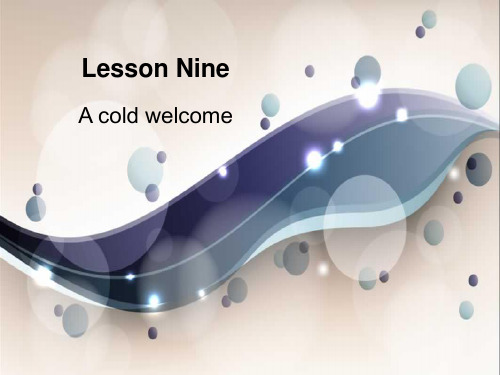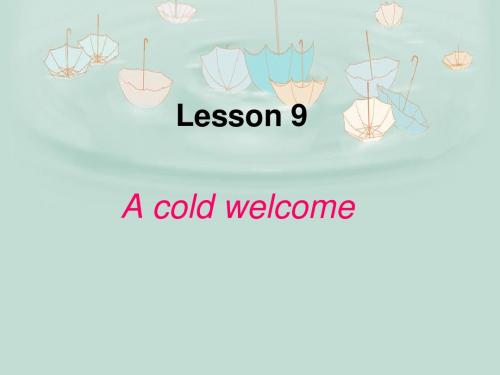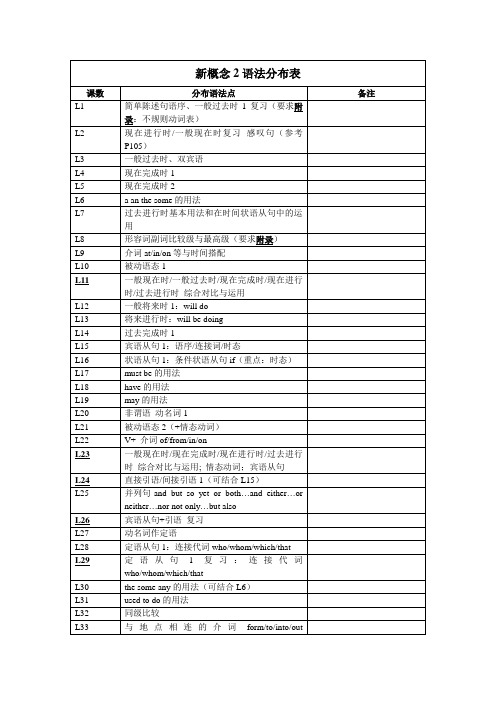L94新概念2,L94课件
Lesson9394(课件)新概念英语第一册

thoe’lTl=ohkeywoil.l一般将来时态
在此刻 At the moment, he’s in Madrid.
一般过去时态
He flew to Spain a week ago.
一般将来时态
He’ll return to London the week after next. 下下周
return to sp.返回 某地
you know the capitals(首都) of these countries?
俄罗斯
希腊
意大利
Lesson94 1 Athens 2 Berlin 3 Bombay n.孟买 4 Geneva n.日内瓦 5 Moscow n.莫斯科 6 Rome n.罗马 7 Seoul n.首尔 8 Stockholm n.斯德哥尔摩 9 Sydney n.悉尼
Nigel is a very lucky man. But his wife isn’t very lucky. She usually stays at home!
一般现在时态表示客观事实
Nigel is our new next-door neighbour. 隔壁邻居
He’s=He is 下下个月
He’s only forty-one years old,
has been to “去过”现在完成时态
and he has already been to nearly
has/have gone to “去了” has/have been in “一直在”
every country in the world. 世界上每个国家
when+从句 when he grows up
新概念英语第2册教学课件 L9

Grammar Focus Time expressions
• 引导时间状语的介词in/on/at/during/till 与until用法
– 3、用at 的时间短语有:
• ① 表示确切的时间:
»at five to twelve / at ten o'clock
• ② 表示其他时刻: »at night / at noon / at midnight / at that time / at the moment / at that moment
Grammar Focus Time expressions
• 引导时间状语的介词in/on/at/during/till 与until用法
– during在……期间, during the holiday
– from…till… 指一段明确的时间:
– until 直到…时候 not…until…直到…才… • I can't enter for the sports meeting until tomorrow. – from…to…从…到
• ② 表示周、月份、年份:
– in a week / in January / in 1992
• ③ 表示季节: – in summer / in spring / in autumn / in winter • ④in+时间长度的短语表示在某段时间之内 – in twenty minutes' time 20 分钟之后
单词词组
on Wednesday evening Town Hall the last day of the year large crowd of people in twenty minutes' time wait and wait five to twelve two minutes past twelve refuse to do sth. at that moment at the moment laugh and sing
NCIIL9新概念第二册课件

Practice
01 There—some tea in the cup. A is B are C isn’t D aren’t 02 We had some troubles–- last Sunday. A in B at C on D / 03 He was born---the morning---June 20. A at; of B on; of C at; on D in; / 04 You will hear from us---two days’ time. A for B in C by D on
They separated during the war. through (自始自终) They were close friends all through their lives.
• 3、from…till… 指一段明确的时间: The tourist season runs from June till October. • 4、from…to… Everyday we have English class from 8:30 to 11:30 • 关于时间表示方法: • What’s the time?/ What time is it?
新概念二册Lesson完美课件

•
3.在品读文字中,继续巩固总分的构 段方法 ,初步 学习围 绕中心 句概述 自然段 主要内 容。
•
4.第五节讲只要细心观察就能获得更 多的知 识。从 植物妈 妈的办 法中, 学生能 感受到 大自然 的有趣 ,生发 了解更 多植物 知识的 愿望, 培养留 心观察 身边事 物的习 惯。
•
5.根据诗歌内容,课文中配有相应的 插图, 形象地 描绘了 三种植 物传播 种子的 方法, 同时告 诉小读 者植物 传播种 子的方 法有很 多,仔 细二册 Lesson 24 课件(共14张PPT)
1. enter the hotel 2. sit down 3. feel upset 4. lose money 5.do nothing 6. these days 7. started to do sth 8.say to sb 9.contain money
grow trees; Online hopping is growing.;
It began to grow dark.
When you grow up, you will know it . She has grown into a beautiful woman.
We went to the mountains except him. (去山里的人不包括他)
新概念二册 Lesson 24 课件(共14张PPT)
新概念二册 Lesson 24 课件(共14张PPT)
1. How much money had you just lost?
I had just lost 50.
2. How did you feel?
I felt upset.
3.Did you tell the manager about it or not?
(完整版)新概念2语法分布表

虚拟语气:用在宾语从句中
L88
虚拟语气3:if从句综合
Hale Waihona Puke L89虚拟语气:情态动词have done
L90
主谓一致
L91
分词作宾语补足语
L92
动名词主动表示被动
L93
非限制性定语从句
L94
动词不定式做宾语补足语
L95
动名词与动词不定式做宾语的含义不同
L96
for表示因为
L17
must be的用法
L18
have的用法
L19
may的用法
L20
非谓语动名词1
L21
被动语态2(+情态动词)
L22
V+介词of/from/in/on
L23
一般现在时/现在完成时/现在进行时/过去进行时综合对比与运用;情态动词;宾语从句
L24
直接引语/间接引语1(可结合L15)
L25
并列句and but so yet or both…and either…or neither…nor not only…but also
L26
宾语从句+引语复习
L27
动名词作定语
L28
定语从句1:连接代词who/whom/which/that
L29
定语从句1复习:连接代词who/whom/which/that
L30
the some any的用法(可结合L6)
L31
used to do的用法
L32
同级比较
L33
与地点相连的介词form/to/into/outof/for/towards/at
L41
must have to need的用法
新概念2第9课精品课件PPT课件

有一个大家都很熟悉的句子:
大家都知道这个句子的意思是“你客气 了”,而它也第有6页/“共38欢页 迎光临”的意思
crowd
• 除了作为名词之外,也可以作为动词。意思是“拥挤”。
• 关于这个词的动词形式,也有一些关
于它的短语:crowd out挤出;推
开、
crowd in挤进、a crowd of一群
laugh
• “laugh”是发笑、笑、嘲笑的意思,而作为名词时意思为笑料、笑声。
• 关于“laugh”的短语有:
laugh at sb.嘲笑某人
“drain”是下水道的意 思,那laugh like a drain 是什么意思?
第12页/共38页
“drain”是下水道 的意思,但是
laugh like a drain意为纵声 大笑,与其一点 关系也没有……
第20页/共38页
课 文
• On Wednesday evening, we went to the Town Hall. It was the last day of the year and a large crowd of people had gathered under the Town Hall clock. It would strike twelve in twenty minutes’ time. Fifteen minutes pass and then, at five to twelve, the clock stopped. The big minute hand did not move. We waited and waited, but nothing happened. Suddenly someone shouted, ‘It’s two minutes past twelve! The clock has stopped!’ I looked at my watch. It was true. The big clock refused to welcome the New Year. At that moment, everybody began to laugh and sing.
最新新概念第二册L24精品课件
complain v. 抱怨 ① vi. 抱怨,发牢骚,诉苦(常与of,about连用) complain of/about …(to sb.) 对某人(mǒu rén)/向某人(mǒu rén)抱怨…… ---Don’t complain about/of the weather. ---I complained of my salary to my boss. ② vi. 控告,抗议(与of,about连用) ---The people in that district complained to the
1.I had just lost 50 pounds. 2.I felt very upset. 3. I told the manager about it. 4.He couldn’t do anything. 5.He began complaining about this wicked world. 6.Just then,a girl came in with the money. 7.She had found it outside my room. 最后(zuìhòu)一句话。
第二页,共25页。
★upset adj. 不安(bù ān)(事发后) nervous adj. 紧张,不安(bù ān)(事发前)
第三页,共25页。
★complain v. 抱怨
① vi. 抱怨,发牢骚,诉苦(常与of,about连用)
complain of/about …(to sb.) 对某人/向某人抱 怨……
Lesson 24 It would be worse
第一页,共25页。
新概念第一册lesson93-94课堂及课后练习
新概念第⼀册lesson93-94课堂及课后练习新概念⼀Lesson93~L94 课内语法新课内容:⼀、单词:拼读、过关、讲解n. 领港员;领航员;引⽔员;舵⼿;航海指南eg. He is a pilot. 他是个飞⾏员。
vi. 回来;返回:return home safe and sound平安回家return to 回到…eg. He' ll return to London. 他将返回伦敦。
vt. 还,归还,送还,退还eg: I returned the book to him.(=I returned him the book.)我把那本书还给他了。
York n.纽约(美国州名);纽约(市),(美国城市)(=New York City)eg. He will fly to New York next month. 下个⽉他将飞往纽约。
n.东京(⽇本⾸都)eg. He will fly to Tokyo. 他将飞往东京。
n.马德⾥(西班⽛⾸都)eg. He is in Madrid . 他在马德⾥。
`:fly to+ 地点飞往...... eg: He' ll fly to Tokyo . 他将飞往东京。
⼆、课⽂:领读、句⼦过关、讲解1.隔壁的next-door next door to... 在……隔壁eg:The school is next door to the hospital. 学校在医院隔壁。
2 be in the 在皇家空军任职(Air Force)3.飞往---fly to4.再下个⽉the month after next next month 下个⽉5.此刻at the moment6.⼀周前a week ago7.再下个星期the week after next8.去过(已经回来)have been to 9.去了(还没回来)have gone tothe world 在世界上at home 呆在家⾥三、语法:可与⼀般将来时连⽤的时间短语⑴this week this month this year(next week next month next yearthe week after next下下周the month after next 下下个⽉the year after next后年注:⼀般过去时中通常会⽤last⼀词,⽽不是next⑵in a day's time ⼀天以后in a year's time⼀年以后in two weeks' time两周后in three months' time三个⽉后例:Where will he be the month after next下下个⽉他将在哪⼉He will be in Beijing.他将在北京⼀、单词连线pilot 飞⾏员Bombay ⽇内⽡fly 返回Athens 汉城return 马德⾥Geneva 雅典,Tokyo 纽约Stockholm 柏林Madrid 飞⾏Seoul 孟买New York 东京Berlin 斯德哥尔摩⼆、单选are going to have a holiday the month ______next.is going to fly _______Tokyo_______to London to study next year.go、______a house next month.sell_______TV last night.新⼀Lesson 93~94 课前测试⼀、单词1.飞⾏员2.返回3.纽约6.飞往10. Geneva11. Moscow 13 Seoul 14. Stockholm16⽚刻,瞬间(L57)>⼆、词组1. 隔壁的2再下个⽉ 3 此时4.⼀周前5.下下周6. 呆在家三、单项选择( ) usually stay __________home on Sundays.( ) are going to have a holiday the month __________next. ( ) are at work ________the moment.`( ) old is heHe is thirty-two _________.old year old years( ) is going to fly ________Tokyo.( ) and Tom _________to London tomorrow, goes , goes , go , goes( ) has already been to _________every country in the world. to to( ) you made an appointment __________the doctor·( ) was _________the years ago.( ) brother _________New York two months ago.to at to at三、汉译英1.他是⼀个星期前飞往西班⽛的。
新概念第二册L95课件.
• The fire broke out in the basement.
• 地下室突然着火。
• break out 可以指火灾、战争等“突然发生”、“爆发”
• 相当于 burst out
• 第一次世界大战于 1914年爆发。 • World War I broke out in 1914. • 当轮船突然着火时,萨莉吓得惊慌失措。 • When the fire broke out in the ship, Sally was frightened out of her wits.
• Get into (= fall into ) 进入某种状态; 陷入
• He gets into a temper if you argue with him.
• You’ll get into trouble if you break that vase. • You’ll get / fall into bad habits if you keep borrowing money. • They have fallen into love for years.
aim
• (2)vi. 目标在于,志向: • 他追求的是金钱。 • What he aims for is money. • 她想成为一名画家。 • She aims to be a painter.
aim
• (3)n. 目的,目标,志向: • 你的生活目的是什么? • What is your aim in life? • 你又没击中目标。 • You've missed your aim again.
post vt.
• (2)邮寄(与物连用,美语用 mail):
• 去年他给我寄了一张圣诞卡。 • He posted me a Christmas card last year. • 你替我把这包裹寄了好吗? • Would you please post this parcel for me?
《新概念汉语(英文版)课本2》第9课课件
巴 ba pa
课文 text
Wáng Fāngfāng: . Nǐ néng jiè wǒ kàn yí xià ma?
王方方:你能借我看一下吗?
Běnjiémíng: Méi wèntí.
本杰明:没问题。
课文 text
Wáng Fāngfāng: Tài hǎo le, xièxie. Nǐ fāngbiàn de shíhou gàosu wǒ ,
本杰明:方便?这里不方便吗?
课文 text
Liú Xiǎoshuāng: Zhèli bù néng fāngbiàn. “Fāngbiàn”shì qù xǐshǒujiān de yìsi.
刘小双:这里不能方便。“方便”是去洗手间的意思。
Běnjiémíng: o, nà wǒ yě qù fāngbiàn yí xià.
21
新概念汉语
Wǒ fāngbiàn de shíhou nǐ bù néng lái
我方便的时候你不能来
生词 New words
买单
mǎidān
方便
fāngbiàn
这里 zhèli
意思 yìsi
能 néng
一下 yíxià
洗手间 xǐshǒujiān
生词 New words
哦 ò
那 nà
下
告诉
能 这里 不能 你能 你 不能
刷卡 方便
借
来
吗? 。
我看一下吗?
。
能/不能 + V.……
Language Points
我去方便一下
你能借我看一下吗? 我能用一下你的手机吗? 请你打扫一下你的房间。 我要去一下卫生间。 我们休息一下吧。
- 1、下载文档前请自行甄别文档内容的完整性,平台不提供额外的编辑、内容补充、找答案等附加服务。
- 2、"仅部分预览"的文档,不可在线预览部分如存在完整性等问题,可反馈申请退款(可完整预览的文档不适用该条件!)。
- 3、如文档侵犯您的权益,请联系客服反馈,我们会尽快为您处理(人工客服工作时间:9:00-18:30)。
◇ Rome n. [rəʊm]
e.g. All roads lead to Rome.
◇ Seoul n. [səʊl] e.g. He comes from Seoul.
◇ Stockholm n. ['stɒkhəʊm]
e.g. I like Stockholm very much.
◇ Sydney n. ['sɪdnɪ]
c
Fill in the blanks
1.-What’s your plan for the holiday next week? -I ___________(visit) Beijing if possible.
will visit began 2.Jack __________ (begin) to write a book about his
-What did you do after school yesterday? -I __ basketball with my friends. A. play B. played C. will play D. am playing
A
Rewrite these sentences.
He went to Beijing last year. He will go to Beijing next year.
e.g. Mike has gone to Sydney.
• • • • • • • • •
7/24/2016
Athens Berlin Bombay Geneva Moscow Rome Seoul Stockholm Sydney
Grammar 1.Simple future tense 一般将来时 next week the week after next
1.He went to New York last week. 2.She went to Sydney last month. 3.I went to Paris the year before last. 4. We went to Stockholm last year. 5. They went to Geneva the week before last.
(2) Simple future tense
时间标志 tomorrow, the day after tomorrow, next week, the week after next, in three days, How soon…?
e.g. I shall graduate next year.
B
Example:
Answer these questions.
Will you go to Athens next week?
(Beijing)
No, I won’t go to Athens next week. I’ll go to Beijing.
1.Will Helen return to Geneva next year? (Bombay) 2. Will you fly to London tomorrow? (Geneva) 3. Will you and Tom go to Madrid next year? (London) 4. Will Tom arrive from Moscow next month? (Madrid) 5. Will Carol and Helen stay in New York next month? (Moscow)
journey two weeks ago.
went (go) to Hawaii last year, 3. I _______ and I _______ will go (go) to California next year.
(1) Remember all the words and phrases we have learned. (2) Listen to the TETV and read after it ten times.
next month the month after next next year the year after next
Translaቤተ መጻሕፍቲ ባይዱe them.
last week this week
last month
last year
this month
this year
2.The difference between simple future tense and simple past tense. (1)Simple past tense 时间标志: yesterday, last week, three days ago the day before yesterday just now , a moment ago, this morning e.g. We went to the cinema last night and saw a very interesting film.
◇ Bombay n.
[bɔm’bei]
e.g. Bombay is a large city in India.
◇ Geneva n.
[dʒi 'ni:və]
e.g. Have you ever been to Geneva.
◇ Moscow n.
['mɒskəʊ]
e.g. There are a lot of people in Moscow.
Lesson 94 When did you/will you go to…?
Period 1
◇ Athens n. ['æθənz]
e.g. I have never been to Athens.
◇ Berlin n. [bə:' lɪn]
e.g. Berlin is a beautiful city.
